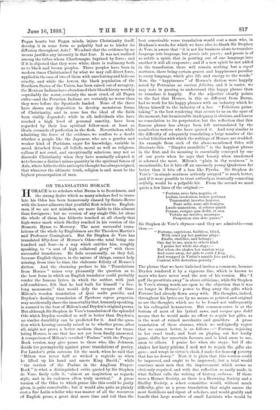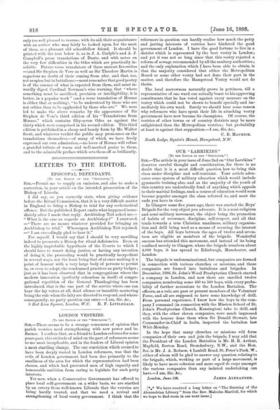ON TRANSLATING HORACE.
HORACE is to scholars what Burns is to Scotchmen, and the strong desire which so many scholars feel to trans- late his Odes has been humorously classed by Sainte-Beuve with the lesser ailments that youthful flesh is heir to. English- men, if we are not mistaken, are more liable to this ailment than foreigners ; but no version of any single Ode, let alone the whole of them, has hitherto touched at all closely that high-water mark which Shelley reached in his version of the Homeric Hymn to Mercury. The most successful trans- lations of the whole by Englishmen are Sir Theodore Martin's and Professor Conington's. But Sir Stephen de Vere has translated fifty-four of Horace's Odes—the total being one hundred and four—in a way which entitles him, roughly speaking, to "a seat of high collateral glory" with those successful translators. He fails occasionally, as they fail, because English rhymes, in the nature of things, cannot help missing, from time to time, the elaborate felicity of Horace's diction. And the charming preface to his "Translations from Horace" raises very pleasantly the question as to the best form in which an English translator could probably render the famous lyrics, in which the author, with just self-confidence, felt that he had built for himself "a live- long monument," that would defy the ravages of time. Milton's wooden translation of Quis multa gracilis, and Dryden's dashing translation of Tyrrhena regum progenies, may accidentally share the immortality that, humanly speaking, is assured to the best of Milton's and Dryden's original poems. But although Sir Stephen de Vere's translation of the splendid Ode which Dryden versified so well is better than Dryden's, AO similar durability can be predicted for it. And the ques- tion which Lessing casually raised as to whether prose, after all, might not prove a better medium than verse for trans- lating Horace, is one that has not yet been finally answered. A comparison of Milton's versified "Psalms "with the Prayer. Bookversion, may give pause to those who, like Johnson, decide too peremptorily against prose translations of poetry.
For Landor's grim sarcasm hit the mark, when he said that "Milton was never half so wicked a regicide as when he lifted up his hand and smote King David ;" while " the version of the Psalms in the Anglican Prayer- Book" is what a distinguished critic, quoted by Sir Stephen de Vere, finely calls it, "almost an inspiration as regards style, and in its cadences often truly metrical." A prose version of the Odes to which praise like this could be justly given, is quite conceivable ; but it would also quite as plainly cost a fine Latin scholar who was master of all the resources of English prose, a great deal more time and toil than the best conceivable verse translation would cost a man who, in Denham's words, for which we have also to thank Sir Stephen de Vere, is aware that "it is not his business alone to translate language into language, but poesie into poesie ; and poesie is of so subtle a spirit, that in pouring out of one language into another it will all evaporate ; and if a new spirit be not added in the transfusion, there will remain nothing but a caput mortuum, there being certain graces and happinesses peculiar to every language, which give life and energy to the words."
Now, the " happinesses " of Horace's diction were happily noted by Petronius as curiosa felicitas, and it is easier, we
may note in passing, to understand this happy phrase than to translate it happily. For the adjective clearly points to the fact that Horace, in this so different from Burns,
had to work for his happy phrases with an industry which he likens himself to the industry of a bee. "Felicitous pains- taking" is the best rendering that occurs to us on the spur of the moment, but its miserable inadequacy is obvious, and leaves no consolation to its perpetrator, but the reflection that this famous phrase has always been left untranslated by the numberless writers who have quoted it. And very similar is the difficulty of adequately translating a large number of the verbal felicities with which the writings of Horace are studded.
An example from each of the above-mentioned Odes will illustrate this. "Simplex munditiis " is the happiest phrase in the first, and its meaning is essentially conveyed by one of our poets when he says that beauty when unadorned is adorned the most. Milton's "plain in thy neatness" is unendurable, for it hits off an uncomely young Qnakeress far better than it hits off a lass like Pyrrha. Sir Stephen de Vere's "in simple neatness artlessly arrayed" is much better, and if it were possible to treat artlessly as ironically connoting artfully, would be a palpable hit. From the second we must quote a few lines of the original :—
" Fortuna 1383V0 heta negotio, et
Ludum insolentem ludere pertinax Transmutat ineertos honores, Nunc mihi, num alii benigna.
Lando manentem; si celeres quatit Pennas, resign° qute dedit, et mea Virtute me involvo, meamquo Pauperiem sine dote qutero."
Sir Stephen de Vere's rhymes—and they are admirable—run
thus :—
" Fortune, capricious, faithless, blind.
With cruel joy her pastime plays : Exalts, enriches, and betrays : One day to me, anon to others kind.
I praise her while she stays ;- But when she shakes her wanton wing
And soars away, her gifts to earth I fling,
And wrapped in Virtue's mantle live and die, Content with dowerless poverty."
The phrase that we have italicised invites a comment, because Dryden rendered it by a vigorous line, which is known to many who have never read the rest of his version. His "I
puff the prostitute away" is above criticism ; while Sir Stephen de Vere's strong words are open to the objection that it was no longer in Horace's power to fling away the gifts which
Fortune had already flown away with. His thoughts, indeed, throughout his lyrics are by no means so pointed and original as are the thoughts which are to be found not unfrequently in his colloquial hexameters. But common-sense is at the bottom of most of his lyrical saws, and resign() quay dedit means that he would make no effort to regain her gifts, as is the wont of ruined merchants and gamblers. A prose translation of these stanzas, which we unfeignedly regret that we cannot better, is as follows :—" Fortune, rejoicing in her cruel trade, and bent on playing out her lordly game, shifts her uncertain favours, and is kind anon to me, anon to others. I praise her when she stays : but if she
shakes her hasty pinions, I seek not to regain the gifts she gave ; and wrapt in virtue's cloak, I make for honest if poverty that has no dowry." Now, it is plain that this version could be improved, and ought to be improved ; but a trial would
convince most men that the improvement which seems so obviously required, and with due reflection so easily made, is what Sallnst calls the writing of history, arduura. If there were a Horace Society, as there is a Browning Society and a Shelley Society, a select committee would, without much difficulty, give us a prose translation that might amuse the most fastidious and ripest of scholars, and would gratify and benefit that large number of small Latinists who would be only too well pleased to resume, with its aid, their acquaintance with an author who may fairly be looked upon, for the most of them, as a pleasant old schoolfellow friend. It should be printed with the text below it, as in J. A. Carlyle's and A. J. Campbell's prose translations of Dante, and with notes on the very few difficulties in the Odes which are practically in- soluble. Future verse translators of these ancient favourites —(and Sir Stephen de Vere as well as Sir Theodore Martin is sagacious no doubt of their coming from afar, and that, too, not as spies, but in battalions)—must remember that good poetry is of the essence of what is expected from them, and must in- wardly digest Cardinal Newman's wise warning, that "where something must be sacrificed, precision or intelligibility, it is better, in a popular work" (and a verse translation of Horace is either that or nothing), "to be understood by those who are not critics than to be applauded by those who are." We were led to make the above remarks by the appearance of Sir Stephen de Vere's third edition of his "Translations from Horace," which contains fifty-seven Odes as against the thirty which were comprised in his second edition. This third edition is published in a cheap and handy form by Mr. Walter Scott, and whatever verdict the public may pronounce on the translations themselves,—of many of which we have freely expressed our own admiration,—no lover of Horace will refuse a grateful tribute of warm and well-merited praise to them, and to the admirable preface which sets them off so brilliantly.



































 Previous page
Previous page